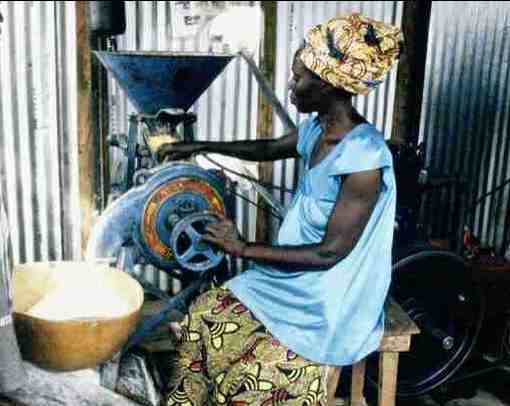 The mechanization of domestic tasks such as milling or husking grains (normally done with a mortar and pestle or grinding stone) can transform the time-consuming actions into profitable economic activities for rural West African women. The Diesel engines responsible for such transformation are being distributed in Burkina Faso, Mali and Senegal by the United Nations Development Program (UNDP) with help from the Bill & Melinda Gates Foundation.
The mechanization of domestic tasks such as milling or husking grains (normally done with a mortar and pestle or grinding stone) can transform the time-consuming actions into profitable economic activities for rural West African women. The Diesel engines responsible for such transformation are being distributed in Burkina Faso, Mali and Senegal by the United Nations Development Program (UNDP) with help from the Bill & Melinda Gates Foundation.
Not only mill work is accomplished. A new diesel-run engine mounted on a steel chassis, called multifunctional platform, or MFP can power a variety of equipment, including a battery charger, and joinery and carpentry equipment. The machine can also generate electricity for lighting, refrigeration and water pumps.
“By investing in this simple power source for rural communities, women no longer need to spend all their time grinding grains or pumping water,” UNDP Administrator Kemal Dervis said as he announced the initiative in Dakar, Senegal. “They have more hours in the day to develop profitable activities that could boost their productivity, enabling them to sell better quality products and increase their income using low-cost, effective technology,” he added.
The benefits of the MFP have already been proven in parts of West Africa, the agency said. In Senegal, S. Sakho of Batantinty explained that before the platform was introduced in her village she rarely earned more than 25,000 CFA ($55) from processing and selling shea butter from nuts.
“With the platform I easily earn 100,000 CFA ($220) at the end of the harvest,” Mrs Sakho said. The yield is high because the time is there. The platform has improved my life. I spend the earnings for the children’s education and clothing; I no longer look like a peasant,” she said.
A $19 million, four-year grant from the Gates Foundation will help establish 600 new sustainable, rural agro-enterprises based on the machine in West Africa, with at least 24 of the MFPs to be biofuel-based, according to UNDP.
As part of the enterprise projects, UNDP and its extensive network of local non-governmental organizations (NGOs) will back the women’s groups with literacy and management training and support.



















